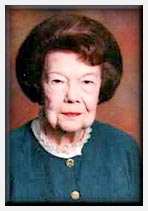Panhandle Lumber Company |
|
 Eloise Lane
Eloise Lane
William Tolbert Wilks, born May 28, 1875, near Fayetteville, Arkansas, came to Gray County in the early 1900s and became an employee of the White Deer Land Company. One of his assignments was to drive the company hack that carried pros- pective buyers to view land that was for sale by the company. Later he was inter- ested in cars and kept them polished and in good running order. His sister Lucy Wilks, married J. E. "Jim" Williams. On December 16, 1906, Will Wilks and Mora Hughey were married at Pampa. Mora, born November 13, 1874, in Grayson County, was the daughter of William Manson Hughey and Rebecca Eskridge Hughey. Mora, who came to Pampa about 1903, was the sister of I. B. Hughey who taught at the first school building in Pampa (513 E, Francis) in the fall of 1907. About 1926 I. B. Hughey built the Hughey House at 321 N. West. In early days Will and Mora Wilks and John and Ellen Chapman lived close to the railroad near present Osage and West Foster streets. John E. Chapman, who had been employed by railroad officials to operate the coal chute, came to Pampa in 1903. He was a member of the school board in 1903-04, 1904-05 and 1905-06. Will Wilks was a member of the school board in 1903-94. The Chapman's youngest child, Wilks Chapman, wаs named for Will Wilks. After working for the White Deer Land Company, Wilks became a farmer and rancher. He owned the west half of Section 100, I. & G. N. Survey and land which included present East Fraser Additions No. 2 and No. 3. In the period when animals were allowed to roam freely over the townsite of Pampa (about 1913-1915). Wilks hired Wade Duncan, then about 14 years old, to shoot the dogs that were attacking the Wilks' cattle. For a number of years Will and Mora Wilks lived in a white frame house at 117 E. Browning. On hot summer evenings they sat in a swing on the long front porch. Some of their neighbors during the 1920s were S. S. and Eula (Duncan) Thomas on the east at 203 E. Browning, J. N. and Gatsy Duncan on the southeast at 320 N. Ballard and J. L. and Donnie Stroope on the west at 102 W. Browning (Cuyler Park in 2001). Whenever Mora Wilks appeared on the streets of Pampa, she was always neatly and properly attired complete with hat and gloves. She was fond of sewing materials and many bolts of cloth were found in her home after her death. About 1928, the first building of the Pampa Country Club was constructed on land purchased from Will and Mora Wilks who sold 100 acres at $80.00 an acre.
About 1955, the Wilks' sold their Ballard and Browning Street property to Ideal Food Store (Frank's True Value Hardware in 2001) and then moved to a home at 1717 Mary Ellen. About 1958, Roger McConnell, who moved from his farm several miles west of Pampa to 1909 Dogwood, joked that he had built his new home in "Will Wilks' cow pasture." Mora Hughey Wilks died on January 9, 1961, in Highland General Hospital, and Will Wilks died on March 17, 1961, in the same hospital. Both were members of the First Christian Church where Mora had taught Sunday School for many years. Dr. Richard Crews, pastor of the church, officiated at both services. The two pioneers were interred in Fairview Cemetery. Wilks Street, extending west from 800 Barrett to U. S. Hwy. 60, was named for Will Wilks. Mora Avenue, extending from 1300 east to Evergreen, was named for Mora Wilks. Mora Wilks Park extends from East Harvester north to 16th Street and from Evergreen east to 1200, 1300 and 1400 Fir and to 1500 and 1600 Grape.
About 1955, the Wilks' sold their Ballard and Browning Street property to Ideal Food Store (Frank's True Value Hardware in 2001) and then moved to a home at 1717 Mary Ellen. About 1958, Roger McConnell, who moved from his farm several miles west of Pampa to 1909 Dogwood, joked that he had built his new home in "Will Wilks' cow pasture." Mora Hughey Wilks died on January 9, 1961, in Highland General Hospital, and Will Wilks died on March 17, 1961, in the same hospital. Both were members of the First Christian Church where Mora had taught Sunday School for many years. Dr. Richard Crews, pastor of the church, officiated at both services. The two pioneers were interred in Fairview Cemetery. Wilks Street, extending west from 800 Barrett to U. S. Hwy. 60, was named for Will Wilks. Mora Avenue, extending from 1300 east to Evergreen, was named for Mora Wilks. Mora Wilks Park extends from East Harvester north to 16th Street and from Evergreen east to 1200, 1300 and 1400 Fir and to 1500 and 1600 Grape.

